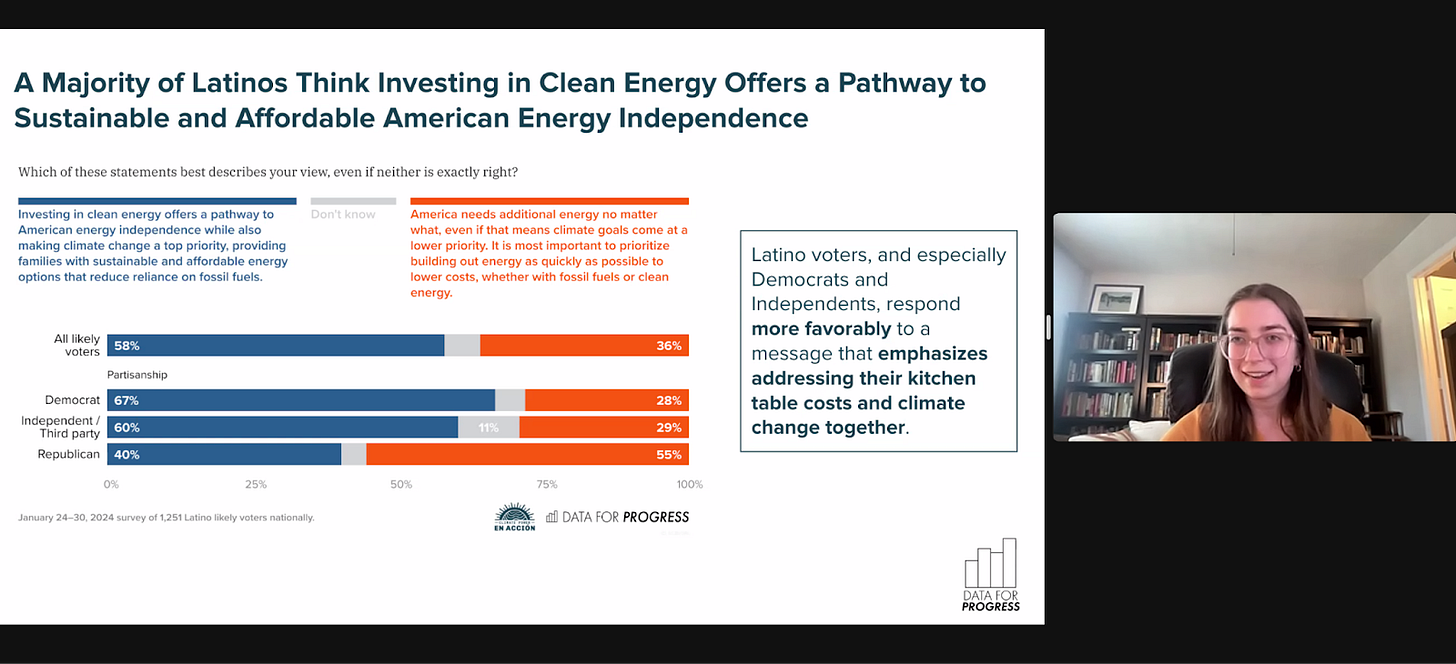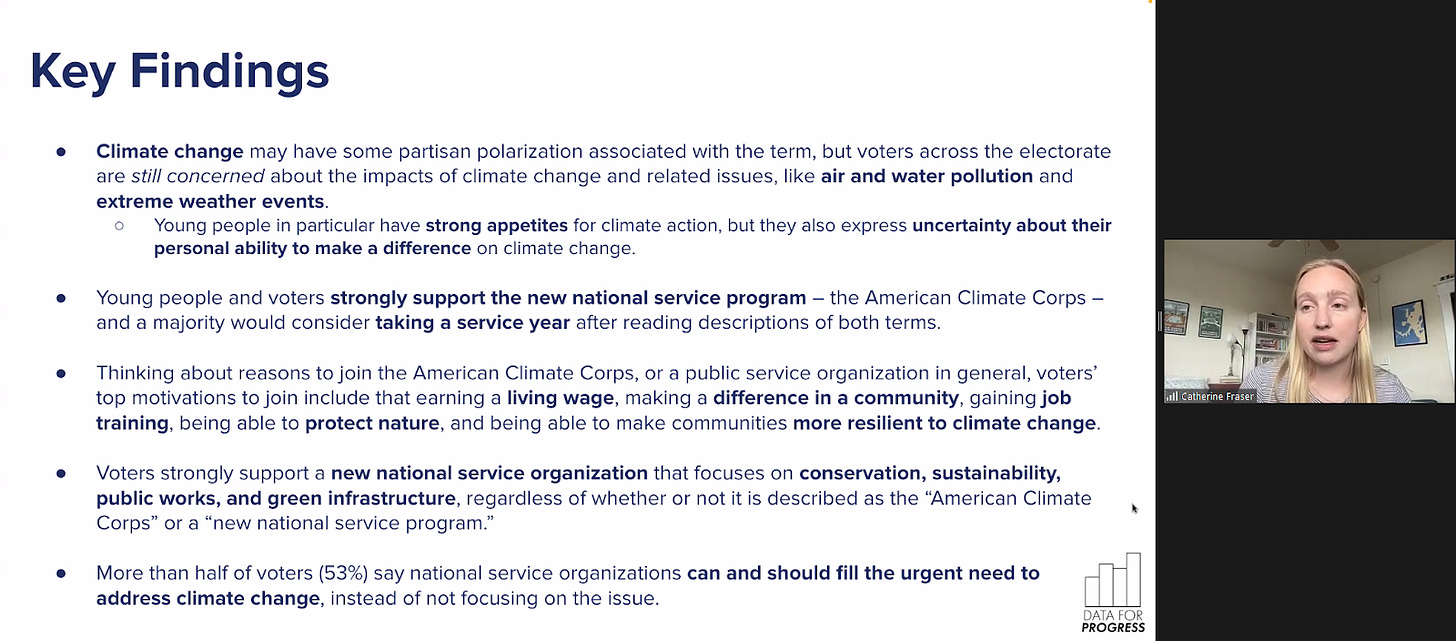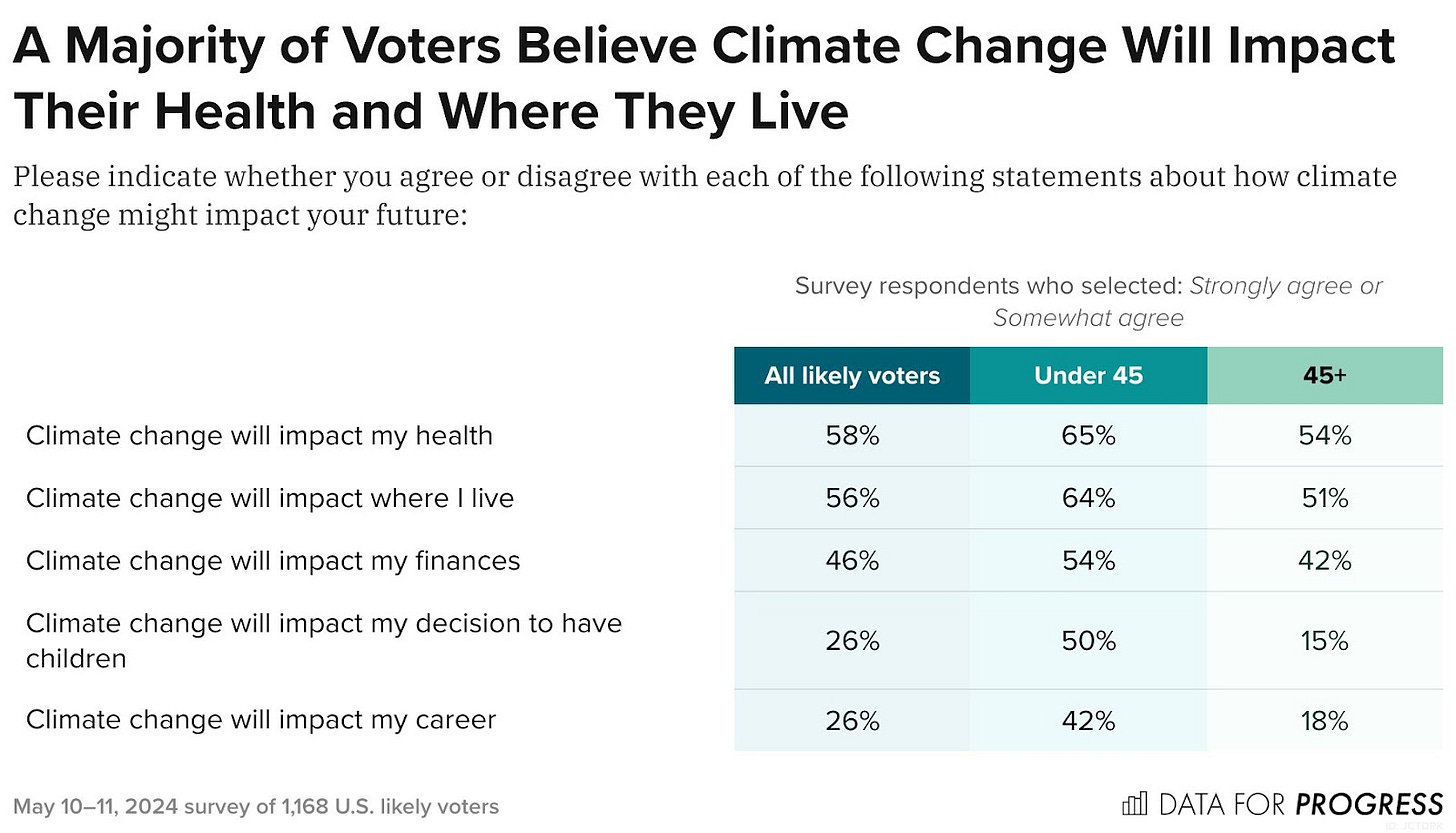Voters See Big Oil Like Jurors See Trump: Guilty
Welcome back to Data for Climate Progress — your one-stop shop for all things climate at Data for Progress.
Welcome back to Data for Climate Progress — your one-stop shop for all things climate at Data for Progress. Catch us here every month for our latest climate polling, juicy insights, and can’t-miss reading lists.
As always, we’d love to hear from you — drop us (Grace Adcox and Catherine Fraser) a line at gracea@dataforprogress.org and catherine@dataforprogress.org. Forwarded this email? You can subscribe below.
The New Republic Said It Best: You’d Be Amazed How Many People Want Big Oil Charged With Homicide
In a new polling released with Public Citizen, we find a majority of voters (62%) believe that oil and gas companies should be held legally accountable for their contributions to climate change. This includes 84% of Democrats and 59% of Independents. We also asked voters about proposals by some legal groups — including Public Citizen — to initiate criminal prosecutions against oil and gas companies. Public Citizen argues that the criminal offense of reckless or negligent homicide — legally defined as causing a death through reckless or negligent conduct — is an appropriate charge for oil and gas companies when extreme weather events caused by climate change kill people. A plurality (49%) of voters support filing these criminal charges against oil and gas companies, including majorities of Democrats (68%), Black voters (56%), and voters under 45 (54%). Read articles from The New Republic and The Guardian covering the polling here and here. For too long, oil and gas companies have reaped high profits at the expense of the health of people and the planet.
Community Engagement Is the Bare Minimum — Communities Can and Should Own Climate Infrastructure
More than three-quarters of voters (76%) say they would approve of a new clean energy or infrastructure project being developed in their area if it were publicly owned, including strong majorities of Democrats (86%), Independents (75%), and Republicans (65%). In a new report out this month, we argue that public ownership of climate infrastructure offers the best avenue for achieving climate justice, when done well. We highlight opportunities to broaden and strengthen public ownership in the U.S. through four examples of public governance structures: solar cooperatives; municipally owned infrastructure, like public utilities; rural electric cooperatives; and Tribal ownership structures. You can read the report here.
First Ukraine, Now Big Oil? Trump’s Latest Quid Pro Quo Turns Off Voters
In new polling with Climate Power, we find that 61% of voters say they would either not be able to vote for a candidate (31%) or would reconsider their vote for a candidate (30%) who tells oil and gas industry executives that donations to their campaign would pay off because of the taxes and regulations Big Oil would avoid. These findings come after Trump reportedly suggested oil and gas executives fundraise $1 billion for his campaign as they would get a “deal” from his intention to roll back climate policies passed under Biden. Read more in The Hill here.
Got Raw Milk? Wait ‘Til You Hear About Bird Flu
Just when we thought we wouldn’t hear the word “pandemic” ever again, the bird flu announced it had other plans. In March, federal public health officials announced that the bird flu had been confirmed in American dairy cattle for the first time. With the current outbreak impacting wild birds, poultry, and dairy cattle, public health experts are concerned that the virus may pose increased danger to humans. Workers in the agricultural industry as well as individuals who consume unpasteurized dairy products (we’re looking at you, Gwyneth Paltrow!) are among those at greatest risk. In a new survey of national likely voters, we find that a bipartisan majority (65%) of likely voters say they would support banning the sale of raw dairy products. This includes 80% of Democrats and 56% of both Independents and Republicans. Read the brief here.
For Latino Voters, It’s Not Just Costs or Climate Alone Shaping Their Views, It’s Both
This month, DFP’s Grace Adcox presented data from our spring survey with Climate Power En Acción at a briefing, diving into the cost and clean energy concerns of Latino voters. Latino voters are deeply impacted by the high cost of living, and are experiencing the financial effects of climate change and extreme weather, with most reporting they have faced higher energy costs over the past year. However, these cost concerns go hand in hand with concerns about climate change. A majority of Latino voters (58%) believe that investing in clean energy offers a pathway to sustainable, affordable energy independence, in contrast with only 36% who believe lowering energy costs is more important – even if that means making climate goals a lower priority. The results reflect our key takeaway that connecting kitchen table concerns about cost with solutions to climate change is a more effective way to speak with Latino voters about climate change and clean energy.

Recruiting for the American Climate Corps? Ground Climate Change in Kitchen Table Issues
DFP’s Catherine Fraser and Grace Adcox joined The Corps Network for a webinar on how to communicate about climate change in the context of national service organizations and the American Climate Corps. Our bottom-line advice for messaging around climate and the ACC? Ground your message in the kitchen table concerns of your audience, make clear why your audience should care about climate, and spotlight key actors who stand to benefit from the ACC and public service organizations, especially in the context of climate change. Watch the recording and see our slides here.

Tired of Living in Unprecedented Times? You’re Not Alone.
As Americans continue to learn about climate change and experience in real time its impacts — like the tornadoes that recently devastated Texas — concern, worry, and anxiety about climate change are predicted to rise. New polling from Data for Progress finds that nearly 3 in 4 voters (74%) are somewhat or very concerned that future generations will be more affected by climate change than they will be in their lifetime. This includes a majority of Democrats (94%), Independents (71%), and Republicans (59%).
Beyond concern for future generations, voters report that their feelings about climate change negatively impact aspects of their daily lives, with a majority saying they feel negatively affected a little or a lot when planning for the future (55%) and spending time in nature (54%).
In addition, some voters, especially those under 45, agree that climate change will impact their future decisions. A majority say that climate change will impact their health (58%) and that it will impact where they live (56%); among voters under 45, those numbers rise to 65% and 64%, respectively. Notably, half of voters under 45 agree climate change will impact their decision to have children.
To help people with climate anxiety, voters are most supportive of providing funding for federal disaster response programs (35%) and helping to make communities more resilient to climate change (29%). Voters also support a variety of mental health services to address climate anxiety, including mental health help hotlines (27%), educational events (26%), free or subsidized mental health care (26%), community climate education and meeting centers (26%), and integrated care for both physical and mental health (24%).
As climate change progresses, its effects on anxiety and mental health will only intensify. These findings show broad support for expanding publicly funded resources and support services for people with climate anxiety. You can read the full brief here.
If you or someone you know is struggling with climate anxiety, here are some resources to learn more and find help:
We Agree With Bill McKibben: Biden Can and Should Make It a Climate Election
Bill McKibben gave a shoutout to our recent poll with Climate Power in his substack The Crucial Years this month. We find that U.S. likely voters back Biden’s most notable climate achievements, as well as ambitious pollution reduction regulations pursued over the course of his term. The survey shows that approval for Biden’s handling of climate change and the environment improves by 17 percentage points among young voters after respondents hear more about his climate action. Approval of Biden’s handling of climate change and the environment reaches 69% among 18- to 34-year-old voters after respondents read a series of questions about his climate achievements. As McKibben says, “Biden put enormous political capital into winning passage of the IRA; he might as well get political gain from all of that.”












